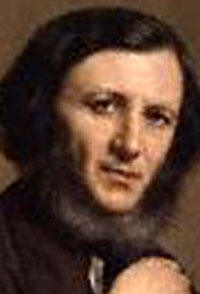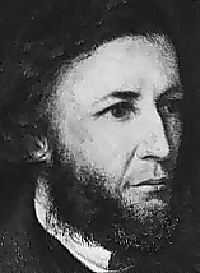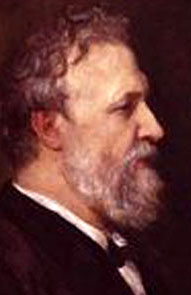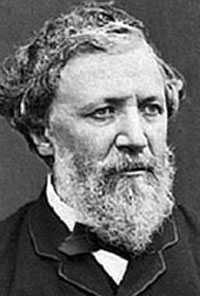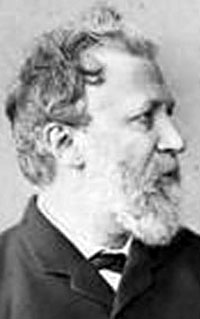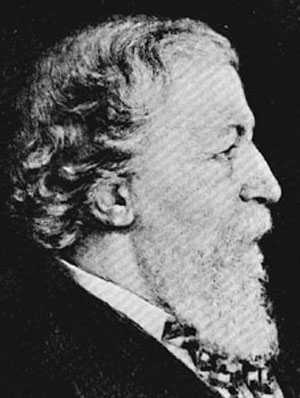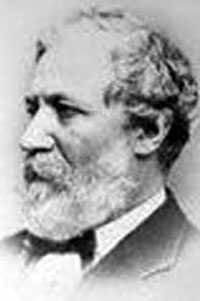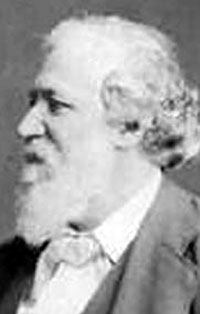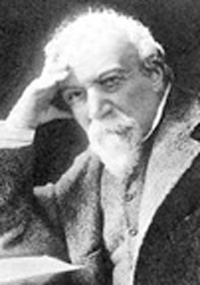Robert Browning
Copyright Michael D. Robbins 2005
Astro-Rayological
Interpretation & Charts
Quotes
Biography
Images and Physiognomic Interpretation
Robert Browning—Poet
May 7, 1812, London, England, 10:00 PM, LMT. (Source: Sabian Symbols) Adjusted to about 9:35 PM, LMT, as presented in An Astrological Who’s Who, by Marc Penfield) Died, December 12, 1889, Venice, Italy.

(Ascendant, Sagittarius with Neptune rising in Sagittarius conjunct the Ascendant; Sun and Mercury in Taurus; Moon in Aries; Venus conjunct Jupiter in Cancer; Mars in Gemini; Saturn in Capricorn; Uranus in Scorpio opposing Sun; Pluto in Pisces)
Evolutionary vision. Dramatic monologues. Deep thinker. Difficult poet. Fell passionately in love with the writings of Elizabeth Barrett, and, therefore, with her. Wooed Elizabeth Barrett passionately. Eloped with her. Lived in Italy. Penetrating psychologist. Philosophical verse. Much compressed. Saul. Fra Lippo Lippi. My Last Duchess. Psychological verse, deep character portrayal. Choppy verse; Uranus opposed Mercury. (Research book of his poetry)
A minute's success pays the failure of years.
Ah, but a man's reach should exceed his grasp. Or what's a heaven for?
Ambition is not what man does... but what man would do.
And gain is gain, however small.
Autumn wins you best by this its mute appeal to sympathy for its decay.
Fail I alone, in words and deeds? Why, all men strive and who succeeds?
Faultless to a fault.
Go practice if you please with men and women: leave a child alone for Christ's particular love's sake!
God is the perfect poet.
Grow old with me! The best is yet to be.
How good is man's life, the mere living! How fit to employ all the heart and the soul and the senses forever in joy!
I count life just a stuff to try the soul's strength on.
Inscribe all human effort with one word, artistry's haunting curse, the Incomplete!
Kiss me as if you made believe You were not sure this eve, How my face, your flower, had pursed It's petals up ...
Like dogs in a wheel, birds in a cage, or squirrels in a chain, ambitious men still climb and climb, with great labor, and incessant anxiety, but never reach the top.
Love is energy of life.
Man partly is and wholly hopes to be.
Motherhood: All love begins and ends there.
My sun sets to rise again.
Never the time and the place and the loved one all together!
Of what I call God, And fools call Nature.
One who never turned his back but marched breast forward, never doubted clouds would break, Never dreamed, though right were worsted, wrong would triumph, Held we fall to rise, are baffled to fight better, sleep to wake.
Perhaps one has to be very old before one learns to be amused rather than shocked.
Stung by the splendor of a sudden thought.
Take away love and our earth is a tomb.
The critical ingredient is getting off your butt and doing something. It's as simple as that. A lot of people have ideas, but there are few who decide to do something about them now. Not tomorrow. Not next week. But today. The true entrepreneur is a doer, not a dreamer.
The moment eternal - just that and no more - When ecstasy's utmost we clutch at the core While cheeks burn, arms open, eyes shut, and lips meet!
'Tis not what man does which exalts him, but what man Would do!
What of soul was left, I wonder, when the kissing had to stop?
What Youth deemed crystal, Age finds out was dew.
What's a man's age? He must hurry more, that's all; Cram in a day, what his youth took a year to hold.
Who hears music feels his solitude peopled at once.
You should not take a fellow eight years old and make him swear to never kiss the girls.
True literary exclusiveness
"Don't you admire Robert Browning as a poet, Mr. Fitzsnook?"
"I used to, once; but everybody admires him now, dontcherknow - so I've had to give him up!"
Robert BrowningRobert Browning (May 7, 1812 – December 12, 1889) was an English poet and playwright.
Robert Browning was born in Camberwell, England, on May 7, 1812, the first son of Robert and Sarah Wiedemann Browning. His father was a man of fine intellect and equally fine character, who worked as a well-paid clerk in the Bank of England and so managed to amass a library of around 6,000 books — many of them highly obscure and arcane. Thus Robert was raised in a household with good literary resources. His mother, to whom he was ardently attached, was a devout Nonconformist, the daughter of a German shipowner who had settled in Dundee, and was alike intellectually and morally worthy of his affection. The only other member of the family was a younger sister, also highly gifted, who was the sympathetic companion of his later years. They lived simply, but his father encouraged Robert's interest in literature and the arts.
In his childhood he was distinguished by his love of poetry and natural history. At 12 he had written a book of poetry which he destroyed when he could not find a publisher. After being at one or two private schools, and showing an insuperable dislike to school life, he was educated by a tutor.
He was a rapid learner and by the age of fourteen was fluent in French, Greek, Italian, and Latin as well as his native English. He became a great admirer of the Romantic poets, especially Shelley. In imitation of the latter, he briefly became an atheist and a vegetarian, but in later life he looked back on this as a passing phase. At age sixteen he attended University College, London, but dropped out after his first year.
Through his mother he inherited some musical talent, and composed settings, for various songs. His grandmother also was of Creole blood. Thomas Chase wrote of Browning's skin complexion as dark, and his hair as curly. The same went for his Jamaican English born wife, Elizabeth Barrett.
Robert BrowningIn May 1833, Browning's Pauline: A Fragment of a Confession was published anonymously by Saunders and Otley, in many ways a vanity publication financed by his family, and this marked the beginning of his career as a poet. A lengthy confessional poem, it was intended by its young author to be merely one of a series of works produced by various fictitious versions of himself (the poet, the composer, etc.), but Browning abandoned the larger project. He was much embarrassed by Pauline in later life, contributing a somewhat contrite preface to the 1868 edition of his Collected Poems asking for his readers' indulgence when reading what in his eyes was practically a piece of juvenilia, before undertaking extensive revisions to the poem in time for the 1888 edition, with the remark "twenty years' endurance of an eyesore seems long enough".
In 1834, he paid his first visit to Italy, in which so much of his future life was to be passed.
In 1835, Browning wrote the lengthy dramatic poem Paracelsus, essentially a series of monologues spoken by the Swiss doctor and alchemist Paracelsus and his friends. Published under Browning's own name, in an edition financed by his father, the poem was a small commercial and critical success and gained the notice of Carlyle, Wordsworth, and other men of letters, giving him a reputation as a poet of distinguished promise. Around this time the young poet was very much in demand in literary circles for his ready wit and flamboyant sense of style, and he embarked upon two ill-considered ventures: a series of plays for the theatre, all of which were dismally unsuccessful and none of which are much remembered today, and Sordello, a very lengthy poem in rhymed pentameter and loosely drawing upon a historical character who also (briefly) appears in Dante's Divine Comedy. Set against the backdrop of the conflict between the Guelphs and Ghibellines, Sordello was already difficult to understand for a Victorian audience that was accustomed to the annotation in historical fiction. Browning's syntax, style and - perhaps most of all - his plot made an already confusing subject virtually incomprehensible and the young poet became the butt of a number of satirical quips, such as Mrs. Carlyle's celebrated comment that she had read the entire thing through without being able to work out whether Sordello was a man, a city or a book. The effect on Browning's career was catastrophic, and he would not recover his good public standing — and the good sales that accompanied it — until the publication of The Ring and the Book nearly thirty years later.
Throughout the early 1840s he continued to publish volumes of plays and shorter poems, under the general series title Bells and Pomegranates. Although the plays, with the exception of Pippa Passes — in many ways more of a dramatic poem than an actual play — are almost entirely forgotten, the volumes of poetry (Dramatic Lyrics, first published in 1842, and 1845's Dramatic Romances and Lyrics) are often considered to be among the poet's best work, containing many of his most well-known poems. Though much admired now, the volumes were largely ignored at the time in the wake of the Sordello debacle.
Marriage
In early 1845, Browning began corresponding with Elizabeth Barrett, a semi-invalid, and the two conducted a secret courtship away from the eyes of her domineering father before marrying in secret in 1846 - a union of ideal happiness - and eloping to Italy. Their son, the painter and critic Robert Wiedemann Browning, known to the family as "Pen", was born in Florence in 1849. The Brownings continued to write and publish poetry from their Italian home throughout the 1850s, with Elizabeth far outshadowing Robert in both critical and commercial reception. Robert Browning's first published work since marriage was the lengthy religious piece Christmas-Eve and Easter-Day, published in 1850. Men and Women, a series of fifty dramatic poems recited by fifty different fictional and historical characters, with a fifty-first, "One Word More", featuring Browning himself as the narrator and dedicated to his wife, was published in 1855. Men and Women — its title taken from a line in his wife's Sonnets from the Portuguese — is generally considered his most successful collection by modern critics, and many have singled it out as one of the finest books published in Victorian England, but the collection elicited little response when first published and sales remained poor.Following Elizabeth's death in 1861, Browning and his son returned to London, paying, however, frequent visits to Italy. When his first new work in nine years, Dramatis Personae, was published in 1864, Browning's reputation was undergoing a critical and popular re-evaluation; a collected edition of his poetry published the previous year had sold reasonably well, as had a number of volumes of selected poems. Dramatis Personae was a collection of eighteen poems, many of which were somewhat darker in tone than those found in Men and Women, the central theme again being dramatic poems narrated by historical, literary and fictional characters. The religious controversies of the time, as well as the depiction of marital distress, increasingly came to the fore of Browning's work. Dramatis Personae was the first volume of Browning poetry to sell well enough to merit a second edition, though sales were still hardly spectacular. His literary status was recognised by the award of an honorary fellowship at Balliol College, Oxford in 1867.
Late success
In 1868, Browning finally completed and published the long blank verse poem The Ring and the Book, which would finally make him rich, famous and successful, and which ensured his critical reputation among the first rank of English poets. Based on a convoluted murder case from 1690s Rome, the poem is composed of twelve volumes, essentially comprising ten lengthy dramatic poems narrated by the various characters in the story showing their individual take on events as they transpire, bookended by an introduction and conclusion by Browning himself. Extraordinarily long even by Browning's own standards (over twenty thousand lines), The Ring and the Book was the poet's most ambitious project and has been hailed as a tour de force of dramatic poetry. Published separately in four volumes from November 1868 through to February 1869, the poem was a huge success both commercially and critically, and finally brought Browning the renown he had sought and deserved for nearly thirty years of work.1882 Caricature from PunchWith his fame and fortune secure, Browning again became the prolific writer he had been at the start of his career. In the remaining twenty years of his life, as well as travelling extensively and frequenting London literary society again, he managed to publish no less than fifteen new volumes. None of these later works gained the popularity of The Ring and the Book, and they are largely unread today. However, Browning's later work has been undergoing a major critical re-evaluation in recent years, and much of it remains of interest for its poetic quality and psychological insight. After a series of long poems published in the early 1870s, of which Fifine at the Fair and Red Cotton Night-Cap Country were the best-received, Browning again turned to shorter poems. The volume Pacchiarotto, and How He Worked in Distemper included a spiteful attack against Browning's critics, especially the later Poet Laureate Alfred Austin. In 1887, Browning produced the major work of his later years, Parleyings with Certain People of Importance In Their Day. It finally presented the poet speaking in his own voice, engaging in a series of dialogues with long-forgotten figures of literary, artistic, and philosophic history. Once more, the Victorian public was baffled by this, and Browning returned to the short, concise lyric for his last volume, Asolando (1889).
According to some reports Browning became romantically involved with Lady Ashburton in the 1870s, but did not re-marry. In 1878, he returned to Italy for the first time since Elizabeth's death, and returned there on several occasions. He died at his son's home Ca' Rezzonico in Venice on 12 December 1889, the same day Asolando was published, and was buried in Poets' Corner in Westminster Abbey; his grave now lies immediately adjacent to that of Alfred Tennyson.
Robert Browning - Biography
Glenn Everett, Associate Professor of English, University of Tennessee at MartinRobert Browning was born on May 7, 1812, in Camberwell (a suburb of London), the first child of Robert and Sarah Anna Browning. His mother was a fervent Evangelical and an accomplished pianist. Mr. Browning had angered his own father and forgone a fortune: the poet's grandfather had sent his son to oversee a West Indies sugar plantation, but the young man had found the institution of slavery so abhorrent that he gave up his prospects and returned home, to become a clerk in the Bank of England. On this very modest salary he was able to marry, raise a family, and to acquire a library of 6000 volumes. He was an exceedingly well-read man who could recreate the seige of Troy with the household chairs and tables for the benefit of his inquisitive son.
Indeed, most of the poet's education came at home. He was an extremely bright child and a voracious reader (he read through all fifty volumes of the Biographie Universelle ) and learned Latin, Greek, French and Italian by the time he was fourteen. He attended the University of London in 1828, the first year it opened, but left in discontent to pursue his own reading at his own pace. This somewhat idiosyncratic but extensive education has led to difficulties for his readers: he did not always realize how obscure were his references and allusions.
In the 1830's he met the actor William Macready and tried several times to write verse drama for the stage. At about the same time he began to discover that his real talents lay in taking a single character and allowing him to discover himself to us by revealing more of himself in his speeches than he suspects-the characteristics of the dramatic monologue. The reviews of Paracelsus (1835) had been mostly encouraging, but the difficulty and obscurity of his long poem Sordello (1840) turned the critics against him, and for many years they continued to complain of obscurity even in his shorter, more accessible lyrics.
In 1845 he saw Elizabeth Barrett's Poems and contrived to meet her. Although she was an invalid and very much under the control of a domineering father, the two married in September 1846 and a few days later eloped to Italy, where they lived until her death in 1861. The years in Florence were among the happiest for both of them. Her love for him was demonstrated in the Sonnets from the Portugese, and to her he dedicated Men and Women, which contains his best poetry. Public sympathy for him after her death (she was a much more popular poet during their lifetimes) surely helped the critical reception of his Collected Poems (1862) and Dramatis Personae (1863). The Ring and the Book (1868-9), based on an "old yellow book" which told of a Roman murder and trial, finally won him considerable popularity. He and Tennyson were now mentioned together as the foremost poets of the age. Although he lived and wrote actively for another twenty years, the late '60s were the peak of his career. His influence continued to grow, however, and finally lead to the founding of the Browning Society in 1881. He died in 1889, on the same day that his final volume of verse, Asolando, was published. He is buried in Poet's Corner of Westminster Abbey.
Robert Browning was born on May 7, 1812, in Camberwell, England. His mother was an accomplished pianist and a devout evangelical Christian. His father, who worked as a bank clerk, was also an artist, scholar, antiquarian, and collector of books and pictures. His rare book collection of more than 6,000 volumes included works in Greek, Hebrew, Latin, French, Italian, and Spanish. Much of Browning's education came from his well-read father. It is believed that he was already proficient at reading and writing by the age of five. A bright and anxious student, Browning learned Latin, Greek, and French by the time he was fourteen. From fourteen to sixteen he was educated at home, attended to by various tutors in music, drawing, dancing, and horsemanship. At the age of twelve he wrote a volume of Byronic verse entitled Incondita, which his parents attempted, unsuccessfully, to have published. In 1825, a cousin gave Browning a collection of Shelley's poetry; Browning was so taken with the book that he asked for the rest of Shelley's works for his thirteenth birthday, and declared himself a vegetarian and an atheist in emulation of the poet. Despite this early passion, he apparently wrote no poems between the ages of thirteen and twenty. In 1828, Browning enrolled at the University of London, but he soon left, anxious to read and learn at his own pace. The random nature of his education later surfaced in his writing, leading to criticism of his poems' obscurities.
In 1833, Browning anonymously published his first major published work, Pauline, and in 1840 he published Sordello, which was widely regarded as a failure. He also tried his hand at drama, but his plays, including Strafford, which ran for five nights in 1837, and the Bells and Pomegranates series, were for the most part unsuccessful. Nevertheless, the techniques he developed through his dramatic monologues—especially his use of diction, rhythm, and symbol—are regarded as his most important contribution to poetry, influencing such major poets of the twentieth century as Ezra Pound, T. S. Eliot, and Robert Frost.
After reading Elizabeth Barrett's Poems (1844) and corresponding with her for a few months, Browning met her in 1845. They were married in 1846, against the wishes of Barrett's father. The couple moved to Pisa and then Florence, where they continued to write. They had a son, Robert "Pen" Browning, in 1849, the same year his Collected Poems was published. Elizabeth inspired Robert's collection of poems Men and Women (1855), which he dedicated to her. Now regarded as one of Browning's best works, the book was received with little notice at the time; its author was then primarily known as Elizabeth Barrett's husband.
Elizabeth Barrett Browning died in 1861, and Robert and Pen Browning soon moved to London. Browning went on to publish Dramatis Personae (1863), and The Ring and the Book (1868). The latter, based on a seventeenth-century Italian murder trial, received wide critical acclaim, finally earning a twilight of reknown and respect in Browning's career. The Browning Society was founded while he still lived, in 1881, and he was awarded honorary degrees by Oxford University in 1882 and the University of Edinburgh in 1884. Robert Browning died on the same day that his final volume of verse, Asolando, was published, in 1889.
